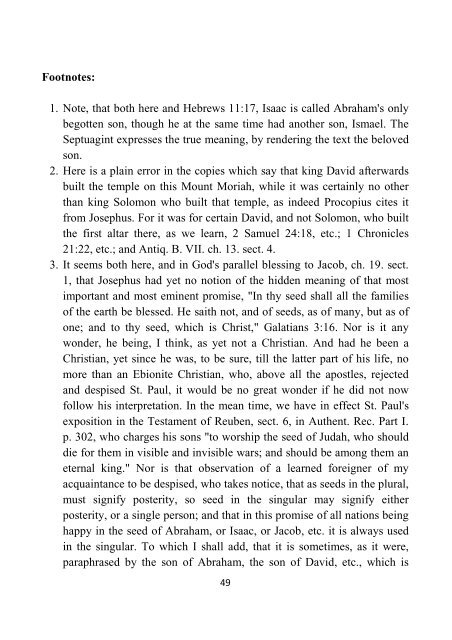From the Creation to the Death of Isaac - Flavius Josephus
- No tags were found...
You also want an ePaper? Increase the reach of your titles
YUMPU automatically turns print PDFs into web optimized ePapers that Google loves.
Footnotes:<br />
1. Note, that both here and Hebrews 11:17, <strong>Isaac</strong> is called Abraham's only<br />
begotten son, though he at <strong>the</strong> same time had ano<strong>the</strong>r son, Ismael. The<br />
Septuagint expresses <strong>the</strong> true meaning, by rendering <strong>the</strong> text <strong>the</strong> beloved<br />
son.<br />
2. Here is a plain error in <strong>the</strong> copies which say that king David afterwards<br />
built <strong>the</strong> temple on this Mount Moriah, while it was certainly no o<strong>the</strong>r<br />
than king Solomon who built that temple, as indeed Procopius cites it<br />
from <strong>Josephus</strong>. For it was for certain David, and not Solomon, who built<br />
<strong>the</strong> first altar <strong>the</strong>re, as we learn, 2 Samuel 24:18, etc.; 1 Chronicles<br />
21:22, etc.; and Antiq. B. VII. ch. 13. sect. 4.<br />
3. It seems both here, and in God's parallel blessing <strong>to</strong> Jacob, ch. 19. sect.<br />
1, that <strong>Josephus</strong> had yet no notion <strong>of</strong> <strong>the</strong> hidden meaning <strong>of</strong> that most<br />
important and most eminent promise, "In thy seed shall all <strong>the</strong> families<br />
<strong>of</strong> <strong>the</strong> earth be blessed. He saith not, and <strong>of</strong> seeds, as <strong>of</strong> many, but as <strong>of</strong><br />
one; and <strong>to</strong> thy seed, which is Christ," Galatians 3:16. Nor is it any<br />
wonder, he being, I think, as yet not a Christian. And had he been a<br />
Christian, yet since he was, <strong>to</strong> be sure, till <strong>the</strong> latter part <strong>of</strong> his life, no<br />
more than an Ebionite Christian, who, above all <strong>the</strong> apostles, rejected<br />
and despised St. Paul, it would be no great wonder if he did not now<br />
follow his interpretation. In <strong>the</strong> mean time, we have in effect St. Paul's<br />
exposition in <strong>the</strong> Testament <strong>of</strong> Reuben, sect. 6, in Au<strong>the</strong>nt. Rec. Part I.<br />
p. 302, who charges his sons "<strong>to</strong> worship <strong>the</strong> seed <strong>of</strong> Judah, who should<br />
die for <strong>the</strong>m in visible and invisible wars; and should be among <strong>the</strong>m an<br />
eternal king." Nor is that observation <strong>of</strong> a learned foreigner <strong>of</strong> my<br />
acquaintance <strong>to</strong> be despised, who takes notice, that as seeds in <strong>the</strong> plural,<br />
must signify posterity, so seed in <strong>the</strong> singular may signify ei<strong>the</strong>r<br />
posterity, or a single person; and that in this promise <strong>of</strong> all nations being<br />
happy in <strong>the</strong> seed <strong>of</strong> Abraham, or <strong>Isaac</strong>, or Jacob, etc. it is always used<br />
in <strong>the</strong> singular. To which I shall add, that it is sometimes, as it were,<br />
paraphrased by <strong>the</strong> son <strong>of</strong> Abraham, <strong>the</strong> son <strong>of</strong> David, etc., which is<br />
49

















